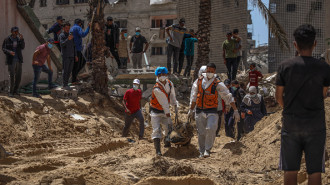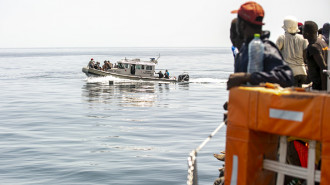'No Palestinian state in Israel's plans' as Israel allocates more than $270 million to expand settlements
A Palestinian state "has no place in Israel's plans," Khalil Tafakji, the top Palestinian expert on Israeli settlements and head of the maps unit at Jerusalem's Orient House, told The New Arab.
Tafakji made his remarks while commenting on the Israeli government's allocation of 1 billion of shekels (more than US$270 million) for the development of illegal Israeli settlements' infrastructure in the occupied West Bank.
"Israel's investment in the settlement's infrastructure follows a strategic logic, where the West Bank will be mostly settled by Israelis," said Tafakji. "Israeli plans for Palestinians in the West Bank is isolated, surrounded urban areas, connected through tunnels and bridges."
According to the Israeli channel 7, the plan was agreed between Israel's finance minister Bezalel Smotrich and transportation minister Meri Regev, to allocate 4 billion and 160 million shekels (US$1 billion and US$94.7 million) for the development of settlements' roads and junctions in the occupied West Bank. Most of the settlement infrastructure in the West Bank is reserved for Israeli settlers only.
Half a billion shekels will be used to enlarge and enhance the road between the Israeli settlement of Ariel, built on Palestinian lands west of Nablus, and the settlement of Tapuah, located south of Nablus. Ariel is considered the largest illegal Israeli settlement block in the occupied West Bank, extending across the green line into Israel.
Israeli reports also indicated that 136 million shekels will be used to develop settlers-only roads to access the settlement block of Beit El, also built on Palestinian lands at the exact northern entrance of the Palestinian city of Ramallah. Beit El houses the command headquarters of the Israeli army in the West Bank.
Instead of being self-sufficient owners of means of production Palestinians have been dispossessed of their economic resources and rights by the Israeli military occupation and Israel’s settlements, and have been transformed into cheap labor (2015) https://t.co/kXXk8VcyRt
— Al-Shabaka الشبكة (@AlShabaka) April 18, 2023
Other funds will be used to develop settlers' roads around east Jerusalem, and in the surroundings of Qalqilya and Salfit.
"This is an implementation of old Israeli plans, especially the Israeli military order number 50 of 1983, concerning roads and transportation," Tafakji explained to TNA.
"These plans have several strategic purposes," said Tafakji. "First, these new roads serve as the base for future settlement expansion in the West Bank, which aims at controlling more land."
"Second, the new roads serve to mark the limits of Palestinian urban areas, cutting their chances for future expansion and their geographical continuity, effectively turning them into ghettos," he added.
Right-wing white Afrikaners moving into the occupied West Bank say they feel nostalgia for the good old days & like the "fresh air" & "open space" in illegal Israeli settlements built on stolen Palestinian lands. pic.twitter.com/HAyxj5AZY3
— Muhammad Shehada (@muhammadshehad2) April 14, 2023
Israeli settlement roads in the West Bank began to be built in the early 1990s following the Oslo accords, where the West Bank was fragmented into Areas 'A', 'B' and 'C'.
Areas where roads and other settlements infrastructure are built are considered 'Area C', where Palestinians are not allowed to build, expand urbanisation or have any kind of autonomous rule or administration. 'Area C' includes 62% of the occupied West Bank.
All Israeli settlements in the West Bank are considered illegal under international law, especially the 4th Geneva convention, which explicitly prohibits an occupying power from transferring its own population into an occupied territory.
Currently, some 750.000 Israeli settlers reside in the occupied West Bank, including Israel's finance minister Bezalel Smotrich, Israel's security minister Itamar Ben-Gvir, former Israeli Prime Minister Neftali Bennet and several other Israeli politicians.



